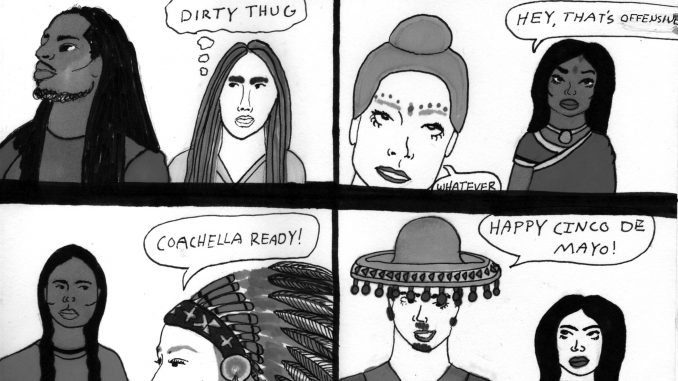
By Alexis Carr
With Halloween quickly approaching, many people prepare to create or purchase their unique costume. However, are people aware that their costume choice may offend someone’s culture?
Cultural appropriation is the adoption of some elements of one culture by a different cultural group. This “appropriation” often occurs without any real understanding of why the original culture took part in these activities or the meanings behind them, often converting culturally significant artifacts, practices, and beliefs into “meaningless” pop-culture or giving them a significance that is completely different/less nuanced than they would originally have had.
The majority group is the most common to participate in cultural appropriation. Critics say cultural appropriation is a form of oppression, saying the majority group has taken everything away from the minority groups yet they still want the one thing minorities has managed to preserve. Living in the 21st century, why does cultural appropriation still occur? And why is it so controversial?
Cultural appropriation has caused a recent growing debate as to if it is offensive or if it brings no harm at all. Staff and students at Indian Trail express their opinions on the topic.
“I definitely understand why people could take this offensively, but I don’t think you can necessary say that all is right and all is wrong. I’m not saying it’s 100 percent okay but I don’t think it is always 100 percent wrong,” said Alyssa Padjen, a Caucasian Indian Trail junior.
From the point of view of someone who has more knowledge and personal experience with the topic, Ramisa Ahmed, also an Indian Trail junior, expresses her concerns and frustrations on cultural appropriation that has been normalized in today’s society.
“I think cultural appropriation happens because of racism. I know for a fact that darker skin people won’t be appreciated for their culture but when it’s on a white man/women, it’s seen as beautiful and exotic,” Ahmed said. “As a South Asian girl, I’ve seen many people of the western culture use my culture as a fashion statement but will not know what any of my culture means. It is taking someone’s culture and using it for their own enjoyment or mockery.“
Minority groups who oppose cultural appropriation believe that it is not an acceptable way to honor, respect, or appreciate people of color. But many well-intentioned and self-proclaimed anti-racists will engage in cultural appropriation in the name of “solidarity.” A prominent example of this is white pro-Palestinian activists wearing keffiyehs. Arab headscarves are symbols of Palestinian nationalism and resistance to occupation. But simply wearing a keffiyeh will not end Israel’s occupation of Palestine.
To one Indian Trail teacher, cultural appropriation is a sensitive issue and people who choose to practice it need to be very careful not to offend the minority culture.
“There’s a difference between making fun of and honoring someone’s culture. The ‘Redskins’ — that’s obviously a racial slur, but a name such as the ‘Kansas City Chiefs,’ no one really have a problem with it because that’s more of a term of respect,” said Michelle Corbett, an Indian Trail teacher of English who is Caucasian.
“It really depends on how you are going to use it and what your motivation is,” said Corbett. “It might seem offensive but that person may not mean any harm. I believe not everyone who takes part in it is trying to be offensive, but I can understand how it could come off that way. Those who participate in it need to be careful and more knowledgeable.”
